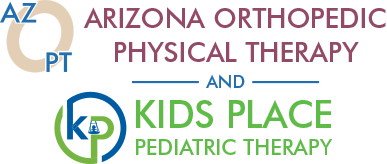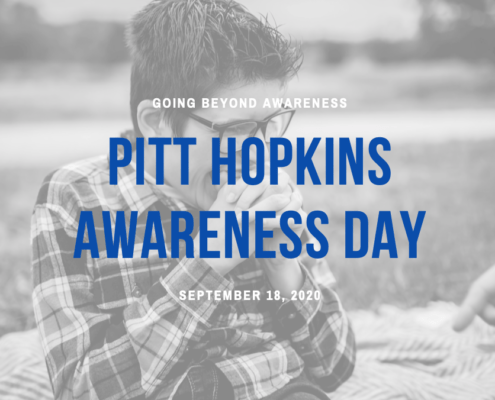Pitt Hopkins Syndrome Awareness
by Lauren Bacsalmasi, DPT
Kids Place Central Pediatric Physical Therapist
Pitt Hopkins is a neurodevelopmental disorder caused by a gene called TCF4 in chromosome 18. While this disorder is considered to be very rare, diagnosis is becoming more common with increased access to genetic testing. It is associated with other disorders such as Autism Spectrum Disorder, Schizophrenia, liver disease, anxiety and ADHD.
What are symptoms of Pitt Hopkins Syndrome?
- Developmental delays – Children with this diagnosis will typically take longer to learn to roll, sit up, and learn to crawl or stand. Some children will learn to walk, and some will not.
- Intermittent breathing pattern changes include periods of hyperventilation followed by periods holding their breath until they turn blue.
- Poor coordination or ataxia1 – may appear to move abnormally or struggle with controlled movement.
- Distinct facial features, such as wide mouth, deep set eyes, and wide nostrils.
- Recurrent seizures/epilepsy.
- Lack of or limited speech.
- Gastrointestinal problems, such as constipation.
- Feeding problems.
- Hypotonia – low muscle tone is often noted, and this can cause children to appear floppy or flexible.
- Happy, excitable demeanor1 often described as smiling excessively, laughing frequently, and being generally easy going. They will often flap their hands with excitement.
- Intellectual disability – traditionally, it was viewed that all people with this diagnosis were severely cognitively impaired1 but some researchers and parents report that there is likely a spectrum of intelligence levels. Due to difficulties with testing people with limited communication skills, it is difficult to accurately measure intelligence.
- Difficulties with social interaction, anxiety and communication skills.
- Problems with vision.
How is it diagnosed?
It is diagnosed through clinical presentation and genetic testing.
How is it treated?
People with Pitt-Hopkins Syndrome are best treated through a team of medical professionals, such as medical doctors, specialists (neurologist, gastroenterologist, etc.), physical therapists, occupational therapists, feeding therapists, and speech therapists.
Is there a cure for Pitt Hopkins Syndrome?
There is currently not a cure for this diagnosis, but the Pitt Hopkins Research Foundation is currently searching for one. You can donate to this organization at https://pitthopkins.org/donate/
For more information, we highly encourage you to visit the website for updated information on this diagnosis, and ways to get involved! September 18th is International Pitt Hopkins Awareness Day, so show your support for these strong individuals and their families.
Works cited
Watkins A, Bissell S, Moss J, et al. Behavioural and psychological characteristics in Pitt-Hopkins syndrome: a comparison with Angelman and Cornelia de Lange syndromes. J Neurodev Disord. 2019;11(1):24. Published 2019 Oct 5. doi:10.1186/s11689-019-9282-0
Dean L. Pitt-Hopkins Syndrome. 2012 Mar 8 [Updated 2018 Aug 1]. In: Pratt V, McLeod H, Rubinstein W, et al., editors. Medical Genetics Summaries [Internet]. Bethesda (MD): National Center for Biotechnology Information (US); 2012-. Available from: https://www.ncbi.nlm.nih.gov/books/NBK66129/
Sweetser DA, Elsharkawi I, Yonker L, et al. Pitt-Hopkins Syndrome. 2012 Aug 30 [Updated 2018 Apr 12]. In: Adam MP, Ardinger HH, Pagon RA, et al., editors. GeneReviews® [Internet]. Seattle (WA): University of Washington, Seattle; 1993-2020. Available from: https://www.ncbi.nlm.nih.gov/books/NBK100240/







